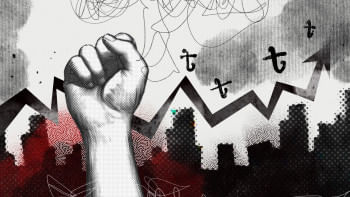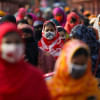Development is not just about macroeconomic progress

The economy is currently dominating discussions and events in Bangladesh, which are further expanding with the imposition of huge tariffs by the United States on nearly 200 countries. People are talking about tariffs, and there is concern that Bangladeshi products, particularly its garment exports, will greatly suffer from the imposition of a 37 percent tariff by the US. The government is discussing future steps to mitigate the impacts. Besides, there are reports and analyses of economic issues in local news media on remittances from the Middle East, the country's balance of payments, or the release of the IMF loan tranches to Bangladesh.
Meanwhile, the Bangladesh Investment Summit 2025 took place in the capital recently. Potential foreign investors have been visiting the town. Promising entrepreneurs also held quite a few events on the issue of startups. Meetings are happening on defaulted loans, banking sector reforms, and concerns of the private sector. It is clear that Bangladesh's economy has slowly been trying to turn around. Yet, with all these happenings, it may be pertinent to make three observations.
First, most of the discussions and events are happening at the macroeconomic level with a focus on foreign exchange reserves, balance of payment deficits, foreign direct investments, etc. These macroeconomic issues are critical for understanding macroeconomic trends and achievements and they carry important implications for policy-making, resource mobilisation, and for monitoring and evaluation. However, do these pure macroeconomic notions and the associated indicators reflect the impacts on human lives and living? Do these macroeconomic concepts, data, and numbers guide our understanding of the realities at the micro level? They do not. Thus, the country's macroeconomic picture is somehow delinked from its micro realities.
For example, the recent macro indicators show that food inflation has come down. However, such information does not tell us about the impact on the day-to-day life of a common person. For instance, during the past months, we had a good paddy harvest, coupled with imports of thousands of tonnes of rice. Yet, rice prices are not going down, affecting the food intake of people. Meanwhile, the market prices of potatoes went down beyond their production costs. On the other hand, watermelons are for sale everywhere—in shops, markets, by the roadside, on the footpath, and by the riverbanks. Yet, a medium-sized watermelon is being sold for almost Tk 300! Do we even know from the macro indicators which prices are determined in the capital's Karwan Bazar market and which in markets outside Dhaka?
Since governments are traditionally preoccupied with macroeconomy, they fail to understand the micro-level impacts on common people's lives. This is unfortunate, because, in the end, development is for the people. Therefore, the macro approach must be linked to the micro-level realities on the ground. While we have to ensure economic stability at the macro level, it must not be done at the cost of unbalancing the lives of common people.
Second, at the macro level, issues discussed include how many billions of dollars may come into Bangladesh's economy as external investments, or how much foreign earnings the country would lose because of the increased US tariffs. Undoubtedly, these are critical concerns in the macroeconomic context, but attention must also be given to the qualitative aspect of these issues. One must consider whether such investments would degrade the environment, causing agricultural losses, whether certain groups of people would face increasing health risks, or whether these investments would impede the sources of livelihoods of the poor and marginalised. To ensure the qualitative aspect of investments at the micro level, participation of the common people in investment decisions is required. But, how much would their views be respected? Would they feel ownership of the whole initiative?
If the focus is only on the acceleration of quantitative progress at the macro level, that may not lead to development at the micro level. This is because progress is either an expansion of a positive trait, e.g. national income, or a reduction of a negative trait, e.g. the infant mortality rate. On the other hand, development encompasses micro-level qualitative transformations along with macro-level quantitative progress. Increases in national income indicate progress, but its equitable distribution means development because that represents transformation.
Third, we are focusing more and more on the financial side of macroeconomy, and not so much on its institutional structures. For human development, different state institutions must be efficient, equitable, and effective. If services are to be provided for human well-being at the micro level, state institutions must have high levels of efficiency. Inefficient institutions lack focus, encourage corruption, and develop vested interests.
If human well-being is to be enhanced at the micro level, the relevant institutional structures must hold and follow some specific norms and values. These include commitments to equal citizens' rights, equity in service delivery, and ensuring the rule of law. Without these, a sustainable people-centred development is not achievable. In addition, individual and collective commitments of people working in state institutions, a sense of selflessness among them, and changes in their outlooks and mindsets are also required.
For state institutions to be effective, a mechanism of transparency and accountability must be in place. One critical pillar of such transparency will be credible and robust information and data, which must be treated as public goods. Furthermore, an effective institution must also have a process of accountability. One way of ensuring transparency and accountability in an institution is to have regular monitoring, assessment, and evaluation of work.
Today, Bangladesh is engaged in building a new social order. Human rights, dignity, tolerance, and equity are at the core of that initiative. This transformation is not economic—or just macroeconomic. This transformation is social, political, and cultural, too. And it is not structured only on quantitative expansions, there should be qualitative transformations, not just in terms of resources, but also institutions. Thus, the issue of reforms is at the core of such changes.
Selim Jahan is former director of the Human Development Report Office under the United Nations Development Programme (UNDP) and lead author of the Human Development Report.
Views expressed in this article are the author's own.
Follow The Daily Star Opinion on Facebook for the latest opinions, commentaries and analyses by experts and professionals. To contribute your article or letter to The Daily Star Opinion, see our guidelines for submission.

 For all latest news, follow The Daily Star's Google News channel.
For all latest news, follow The Daily Star's Google News channel. 










Comments